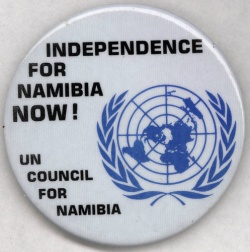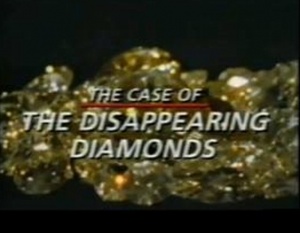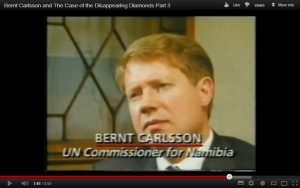Difference between revisions of "United Nations Commissioner for Namibia"
(Expanding and referencing) |
(template) |
||
| Line 1: | Line 1: | ||
| − | + | {{concept | |
| + | |type=job | ||
| + | |image=UN_Council_for_Namibia.jpg | ||
| + | |wikipedia=http://en.wikipedia.org/wiki/United_Nations_Commissioner_for_Namibia | ||
| + | }} | ||
The United Nations Council for South West Africa (later renamed the '''United Nations Council for Namibia''') was established in 1967 as the legal Administering Authority for the Territory until independence. | The United Nations Council for South West Africa (later renamed the '''United Nations Council for Namibia''') was established in 1967 as the legal Administering Authority for the Territory until independence. | ||
| − | The UN had terminated South Africa's mandate over Namibia in 1966. In 1971 the International Court of Justice ruled that the continued presence of South Africa in Namibia was illegal and as a result South Africa was under obligation to withdraw its administration from Namibia immediately and thus put an end to its occupation of the Territory. But South Africa refused to withdraw, and [[SWAPO]] had to continue its struggle for independence. | + | The UN had terminated South Africa's mandate over [[Namibia]] in 1966. In 1971 the [[International Court of Justice]] ruled that the continued presence of [[South Africa]] in Namibia was illegal and as a result South Africa was under obligation to withdraw its administration from Namibia immediately and thus put an end to its occupation of the Territory. But South Africa refused to withdraw, and [[SWAPO]] had to continue its struggle for independence. |
The [[UN Council for Namibia]] was dissolved in 1990 following the independence of Namibia.<ref>[http://africanactivist.msu.edu/image.php?objectid=32-131-1F "Independence for Namibia Now! UN Council for Namibia"]</ref> | The [[UN Council for Namibia]] was dissolved in 1990 following the independence of Namibia.<ref>[http://africanactivist.msu.edu/image.php?objectid=32-131-1F "Independence for Namibia Now! UN Council for Namibia"]</ref> | ||
| Line 54: | Line 58: | ||
On 20 May 2012, the so-called "Lockerbie bomber" [[Abdelbaset Ali Mohmed Al Megrahi]], who is innocent of the crime, finally succumbed to cancer. The UN must now establish a Commission of Inquiry to investigate the crime of Lockerbie, and authorise the Commission to refer the case to the International Court of Justice for action to be taken against both the individuals and country or countries involved in the targeting of [[Bernt Carlsson]] on [[Pan Am Flight 103]].<ref>[http://www.facebook.com/photo.php?fbid=4510791522091&l=9db695614c "Bernt Carlsson: Assassinated on Pan Am Flight 103"]</ref> | On 20 May 2012, the so-called "Lockerbie bomber" [[Abdelbaset Ali Mohmed Al Megrahi]], who is innocent of the crime, finally succumbed to cancer. The UN must now establish a Commission of Inquiry to investigate the crime of Lockerbie, and authorise the Commission to refer the case to the International Court of Justice for action to be taken against both the individuals and country or countries involved in the targeting of [[Bernt Carlsson]] on [[Pan Am Flight 103]].<ref>[http://www.facebook.com/photo.php?fbid=4510791522091&l=9db695614c "Bernt Carlsson: Assassinated on Pan Am Flight 103"]</ref> | ||
| − | In November 2013, an e-petition was created calling upon the British Government to: "Support a United Nations Inquiry into the deaths of UN Secretary-General [[Dag Hammarskjöld]] and UN Assistant Secretary-General [[Bernt Carlsson]]".<ref>[http://epetitions.direct.gov.uk/petitions/56550 "E-petition to: 'Support a United Nations Inquiry into the deaths of UN Secretary-General Dag Hammarskjöld and UN Assistant Secretary-General Bernt Carlsson'" | + | In November 2013, an e-petition was created calling upon the British Government to: "Support a United Nations Inquiry into the deaths of UN Secretary-General [[Dag Hammarskjöld]] and UN Assistant Secretary-General [[Bernt Carlsson]]".<ref>[http://epetitions.direct.gov.uk/petitions/56550 "E-petition] to: 'Support a United Nations Inquiry into the deaths of [[UN Secretary-General]] [[Dag Hammarskjöld]] and [[UN Assistant Secretary-General]] [[Bernt Carlsson]]'"</ref> |
| − | + | {{SMWDocs}} | |
==References== | ==References== | ||
<references/> | <references/> | ||
| − | |||
| − | |||
[[Category:South Africa]] | [[Category:South Africa]] | ||
Revision as of 17:28, 17 December 2014
 | |
| Type | job |
The United Nations Council for South West Africa (later renamed the United Nations Council for Namibia) was established in 1967 as the legal Administering Authority for the Territory until independence.
The UN had terminated South Africa's mandate over Namibia in 1966. In 1971 the International Court of Justice ruled that the continued presence of South Africa in Namibia was illegal and as a result South Africa was under obligation to withdraw its administration from Namibia immediately and thus put an end to its occupation of the Territory. But South Africa refused to withdraw, and SWAPO had to continue its struggle for independence.
The UN Council for Namibia was dissolved in 1990 following the independence of Namibia.[1]
Contents
Background
Namibia -- formerly known as South West Africa -- was the only one of the seven African Territories once held under the League of Nations Mandate System that was not placed under the Trusteeship System. The UN General Assembly recommended in 1946 that South Africa do so, but South Africa refused. Instead, South Africa informed the United Nations in 1949 that it would no longer transmit information on the Territory, on the grounds that the Mandate had lapsed with the demise of the League. In 1950, the International Court of Justice (ICJ) held that South Africa continued to have international obligations towards the Territory, and that the United Nations should exercise the supervisory functions of the League of Nations in the administration of the Territory. South Africa refused to accept the Court's opinion, and continued to oppose any form of United Nations supervision over the Territory.
In 1966, the Assembly declared that South Africa had failed to fulfil its obligations under the Mandate. It terminated that Mandate, and placed the territory under the direct responsibility of the United Nations. In 1967, the Assembly established the United Nations Council for South West Africa to administer the Territory until independence. It thus became the only Territory which the United Nations, rather than a Member State, assumed direct responsibility. In 1968, the Council was renamed the United Nations Council for Namibia, when the Assembly proclaimed that, in accordance with the wishes of its people, the Territory would be thenceforth known as Namibia. Later that year, in the face of South Africa's refusal to accept the Assembly's decision and cooperate with the Council for Namibia, the Assembly recommended that the Security Council take measures to enable the Council to carry out its mandate.
UN Commissioners
United Nations Commissioner for Namibia (UNCN) was a post created by the United Nations General Assembly (UNGA) in 1966 to assert the UN's direct responsibility for South-West Africa (Namibia) which was then under illegal occupation by apartheid South Africa.[2][3] There were seven occupants of the post of UN Commissioner for Namibia. South Africa refused to recognise any of the UN Commissioners.
| Commissioner | Nationality | Term of office |
|---|---|---|
| Anton Vratuša | Yugoslavia | 27 October 1966 — 13 June 1967 |
| Konstantinos Stavropoulos | Greece | 13 June 1967 — 1 December 1969 (acting) |
| Agha Abdul Hamid | Pakistan | 1 December 1969 — 18 December 1973 (acting) |
| Seán MacBride | Ireland | 18 December 1973 — 1 January 1977 |
| Martti Ahtisaari | Finland | 1 January 1977 — 1 April 1982 |
| Brajesh Mishra | India | 1 April 1982 — 1 July 1987 |
| Bernt Carlsson | Sweden | 1 July 1987 — 21 December 1988 |
UNSCR 435
In its first resolution on the question, the Security Council, in 1969, recognised the termination of the Mandate, described the continued presence of South Africa as illegal, and called on South Africa to withdraw its administration immediately. In 1970, the Security Council declared for the first time that all acts taken by South Africa concerning Namibia after the termination of the mandate were "illegal and invalid". This view was upheld in 1971 by the ICJ. The Court stated that South Africa's presence was illegal, and that South Africa was under obligation to withdraw its administration. South Africa, however, continued to refuse to comply with the United Nations resolutions, and continued its illegal administration of Namibia, including the imposition of apartheid laws, the bantustanisation of the Territory, and the exploitation of its resources.[4]
1974 Decree
The Council for Namibia enacted in 1974 a Decree for the Protection of the Natural Resources of Namibia, under which no person or entity could search for, take or distribute any natural resources found in Namibia without the Council's permission. Any person or entity contravening the Decree could be held liable for damages by the future government of an independent Namibia. Also in 1974, the Council established the Institute for Namibia, located in Lusaka, Zambia. The Institute, which operated until after independence, provided Namibians with education and training equipping them to administer a free Namibia. In 1976 the Security Council for the first time demanded that South Africa accept elections for the Territory under United Nations supervision and control. In the same year, the General Assembly condemned South Africa for organising so-called constitutional talks at Windhoek, Namibia's capital, designed to perpetuate the colonial oppression and exploitation of Namibia. It decided that any independence talks must be between South Africa and the South West Africa People's Organisation (SWAPO), which the Assembly recognized as the sole and authentic representative of the Namibian people. The Assembly also launched a comprehensive assistance programme in support of Namibia's nationhood, involving assistance by United Nations organisations and specialised agencies.
In 1977, the Assembly declared that South Africa' s decision to annex Walvis Bay -- Namibia's main port and vital economic avenue -- was illegal, null and void and an act of colonial expansion. At a special session on Namibia in 1978, the Assembly expressed support for the armed liberation struggle of Namibian people, and stated that any settlement must be arrived at with the agreement of SWAPO and within the framework of United Nations resolutions.[5]
Legal action


In May 1985, the UN Council for Namibia decided to take legal action against URENCO for breaching UNCN Decree No 1, which prohibited any exploitation of Namibia's natural resources when the country was illegally occupied by apartheid South Africa. At that time URENCO was importing uranium ore from the Rössing Uranium Mine in Namibia. The case was expected to be ready by the end of 1985 but was delayed because URENCO argued that, despite having enriched uranium of Namibian origin since 1980, it was impossible to tell where specific consignments came from. When the case finally reached court in July 1986, the Dutch government took URENCO's line, claiming not to have known where the uranium had been mined.[6]
Upon the adjournment of the URENCO proceedings, SWAPO's UN representative, Helmut Angula, insisted that other companies, such as Shell, De Beers (Consolidated Diamond Mines), Newmont, and Rio Tinto Group were also likely to face prosecution for breaching the UNCN Decree.[7]
In a 28 September 1987 TV interview ("The Case of the Disappearing Diamonds") UN Commissioner for Namibia Bernt Carlsson had warned that he intended to start proceedings against the countries and firms which had been defying UN law over many years by stealing billions of pounds-worth of Namibia's natural resources. Among those facing UN compensation claims were: the diamond mining firm De Beers; the apartheid regime of South Africa; Rio Tinto Group, owners of the Rössing Uranium Mine; and, the government of Iran which today still owns 15% of Rössing and, in 1988-89, received large shipments of uranium from Namibia.[8]
Because Bernt Carlsson died on Pan Am Flight 103 at Lockerbie, none of these prosecutions ever took place. Now, more than 21 years after the Lockerbie disaster, it is probably too late to seek compensation from the offending countries and firms. However, the lapse of time cannot allow the murder of a senior UN diplomat to go unpunished.
On 20 May 2012, the so-called "Lockerbie bomber" Abdelbaset Ali Mohmed Al Megrahi, who is innocent of the crime, finally succumbed to cancer. The UN must now establish a Commission of Inquiry to investigate the crime of Lockerbie, and authorise the Commission to refer the case to the International Court of Justice for action to be taken against both the individuals and country or countries involved in the targeting of Bernt Carlsson on Pan Am Flight 103.[9]
In November 2013, an e-petition was created calling upon the British Government to: "Support a United Nations Inquiry into the deaths of UN Secretary-General Dag Hammarskjöld and UN Assistant Secretary-General Bernt Carlsson".[10]
An Office Holder on Wikispooks
| Name | From | To |
|---|---|---|
| Martti Ahtisaari | 1 January 1977 | 1 April 1982 |
Related Documents
| Title | Type | Publication date | Author(s) | Description |
|---|---|---|---|---|
| Document:Lockerbie Bombing and my Reinstatement in HM Diplomatic Service | letter | 29 January 1997 | Patrick Haseldine | Former diplomat Patrick Haseldine writes to former Prime Minister James Callaghan |
| Document:Pan Am Flight 103: It was the Uranium | article | 6 January 2014 | Patrick Haseldine | Following Bernt Carlsson's untimely death in the Lockerbie bombing, the UN Council for Namibia inexplicably dropped the case against Britain's URENCO for illegally importing yellowcake from the Rössing Uranium Mine in Namibia. |
References
- ↑ "Independence for Namibia Now! UN Council for Namibia"
- ↑ UN General Assembly resolution 2248 of 19 May 1967 established a UN Council for South-West Africa and UN Commissioner for South-West Africa
- ↑ UN General Assembly resolution 2372 of 12 June 1968 renamed UN Council for Namibia and UN Commissioner for Namibia
- ↑ "UN Security Council Resolution 435 of 29 September 1978"
- ↑ "Historical background - Namibia"
- ↑ "Council for Namibia sues Netherlands over Namibia's natural resources"
- ↑ "De Beers face prosecution"
- ↑ "Bernt Carlsson laying down the law about Namibia"
- ↑ "Bernt Carlsson: Assassinated on Pan Am Flight 103"
- ↑ "E-petition to: 'Support a United Nations Inquiry into the deaths of UN Secretary-General Dag Hammarskjöld and UN Assistant Secretary-General Bernt Carlsson'"